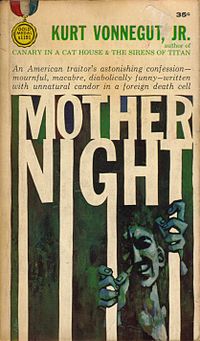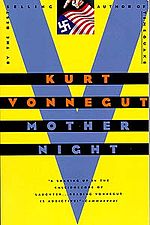- Mother Night
-
Mother Night 
Cover art of first edition paperbackAuthor(s) Kurt Vonnegut Country United States Language English Genre(s) Novel Publisher Fawcett Publications/Gold Medal Books Publication date 1961 Media type Print (hardcover & paperback) ISBN 978-0385334143 Mother Night is a novel by American author Kurt Vonnegut, first published in 1961. The title of the book is taken from Goethe's Faust.
It is the fictional story of Howard W. Campbell Jr., an American, who moved to Germany directly after World War I and then later became alternately a well-known playwright and a Nazi propagandist. The action of the novel is narrated (through the use of metafiction) by Campbell himself. The premise is that he is writing his memoirs while awaiting trial for war crimes in an Israeli prison. Howard W. Campbell also appears briefly in Vonnegut's later novel Slaughterhouse-Five.
Contents
Plot summary
Germany before World War II
During the Nazi build-up after Adolf Hitler seized power in 1933, Campbell decides to stay on in Germany despite his parents' decision to leave. He continues to write plays, his only associations being with members of the ruling Nazi party as his social contacts. Being of sufficiently Aryan parentage, Campbell becomes a member of the Nazis in name only. He is politically apathetic, caring only for his art and his wife Helga, who is also the starring actress in all of his plays.
The first part of the book ends after Campbell has an encounter on a park bench in the Berlin Zoo. While sitting on the bench he is approached by a man calling himself Frank Wirtanen, an agent of the U.S. War Department. Wirtanen wants Campbell to spy for the U.S. in the upcoming war. Campbell immediately rejects the offer, but Wirtanen quickly adds that he wants Campbell to think about it. He tells him that Campbell's answer will come in the form of how he acts and what positions he assumes once the U.S. and Germany declare war on each other.
Germany in World War II and afterward
Once World War II starts, Campbell begins to make his way up through Joseph Goebbels' propaganda organization, eventually becoming the "voice" of broadcasts aimed at converting Americans to the Nazi cause. The spy part of the job comes in when he is transmitting his vitriolic messages; unbeknownst to the Nazis, all of the idiosyncrasies of his speech (deliberate pauses, coughing, etc.) are part of the coded information he is passing to the American Office of Strategic Services (the predecessor of the Central Intelligence Agency). Campbell never discovers, nor is he ever told (except in one notable instance), the information that he is sending.
About halfway through the war his wife goes to the eastern front to entertain the German troops. Campbell is extremely distraught when he hears that the camp where she had been entertaining in Crimea had been overrun and she was presumed dead. (In a much later exchange, Wirtanen reveals the sad truth; Campbell's wife's probable death was included in one of his own coded messages about a week before Campbell was told). Right before the Soviet Army invades Berlin, Campbell visits his in-laws one last time. Helga's father had been chief of police in Berlin and tells Campbell that he never liked him, and had always thought that Campbell was a spy. He goes on to say though that even if he had been a spy, he had been so good at the propaganda business that he never could have served the other side better than he had served Nazi Germany. Campbell then has an exchange with Helga's younger sister, Resi, that will resonate with him years later.
Eventually, he is captured by U.S. forces. Wirtanen works a deal in which Campbell is set free and then given passage to New York City, whence the rest of the action of the book takes place.
New York City
In New York City, Campbell lives a lonely, anonymous life, sustained only by memories of his wife and an indifferent curiosity about his eventual fate. His only friend is George Kraft, a similarly lonely neighbor—who, through an extraordinary coincidence, also happens to be a Soviet intelligence agent. He tries to trick Campbell into fleeing to Moscow by publicizing the fact that Campbell has been living in New York since the end of the war.
A white supremacist organization learns of his existence and makes him a cause celebre, inviting him to speak to new recruits as a "true American patriot." The group's leader, a dentist named Lionel Jones, shows up at Campbell's apartment with a surprise: a woman claiming to be Helga, alive and well and professing her undying love. Campbell's will to live returns for the first time in years, and remains even after he finds out that she is not Helga, but rather her younger sister Resi. They plan to escape to Mexico City after attending one of Jones' fascist meetings.
There, Wirtanen makes an appearance to warn Campbell of Kraft's plot, and of Resi's complicity in it. Heartbroken, Campbell decides to go along with the charade. He confronts Kraft and Resi, the latter swearing her feelings for him are genuine. The FBI then raids the meeting and takes Campbell into custody, while Resi commits suicide by taking a cyanide capsule. As before, Wirtanen uses his influence to get Campbell set free. Once Campbell returns to his apartment, however, he realizes that he has no real reason to continue living, and decides to turn himself in to the Israelis to stand trial.
Israel
The book ends as it began, with Campbell sitting in his Israeli jail cell waiting for his trial. Coincidentally, he meets Adolf Eichmann and gives him advice on how to write an autobiography. He then is transferred to a different holding cell where he further awaits his trial. At the very end of the book Campbell inserts a letter that he has just received from Wirtanen. The corroborating evidence that he was indeed an American spy during World War II has finally arrived, and Wirtanen writes that he will testify to Campbell's true loyalties in court. Rather than being relieved, Campbell feels "nauseated" by the idea that he will be saved from death and granted freedom when he is no longer able to take pleasure in anything life has to offer. In the last lines Campbell tells us that he will hang himself not for crimes against humanity, but rather for "crimes against himself."
"The Moral of the Story"
"This is the only story of mine whose moral I know. I don't think it's a marvelous moral, I just happen to know what it is..."
Vonnegut's "So-it-goes" nonchalance announces on the first page of the Introduction. "The moral of the story" appears again and throughout Mother Night from this point on, and Vonnegut continuously revises upon it, after saying, "We are what we pretend to be, so we must be careful about what we pretend to be."
Variant to this moral, Vonnegut later resumes, "When you're dead, you're dead." Vonnegut then pauses in the prose, and reflects the last moral in his Introduction, which is; "And yet another moral occurs to me now; Make love when you can. It's good for you."
Literary devices
Throughout the novel Vonnegut uses meta-fiction devices to call attention to the text itself. Most notably is Vonnegut's framing of the novel as a historical document. The editor's note at the beginning of the novel suggests Campbell's writings, the text of the novel itself, are a manuscript that Vonnegut received and is editing for public view.
These devices of meta-fiction can also be expanded to include Vonnegut's approach to character introductions, and character development. In opposition to the common Show, don't tell rule in literature, Vonnegut observes his characters from an almost omniscient perspective; for example, "His name is Andor Gutman. Andor is a sleepy, not very bright Estonian Jew. He spent two years in the extermination camp at Auschwitz. According to his own reluctant account, he came this close to going up a smokestack of a crematorium there."
While this style of character deconstructionism is less prevalent in Mother Night than it is in God Bless You, Mr. Rosewater, or Breakfast of Champions, the pervading-style of prose throughout the book is largely intertwined with, as previously mentioned, meta-fiction techniques. Vonnegut's innovated, literary omniscience is one of these techniques through which Vonnegut's trademark "so it goes..." attitude achieves a certain degree of meta-morality by virtue of its omniscient, dissociative and detached tone within the prose.
Adaptations
A film version was released in 1996, starring Nick Nolte as Campbell, Sheryl Lee as Helga/Resi, Alan Arkin as Kraft and John Goodman as Wirtanen.
In 2009, Audible.com produced an audio version of Mother Night, narrated by Victor Bevine, as part of its Modern Vanguard line of audiobooks.
External links
Categories:- Novels by Kurt Vonnegut
- 1961 novels
- Postmodern novels
- American novels adapted into films
Wikimedia Foundation. 2010.

